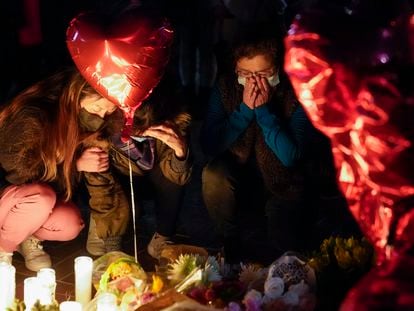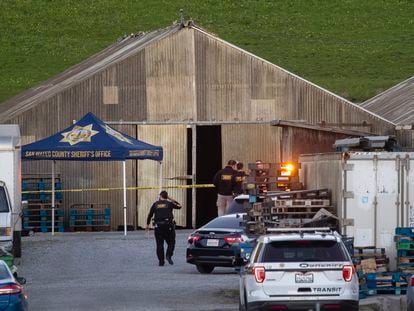Two mass shootings in California reignite US gun control debate
Biden urges Congress to ban assault weapons and raise the minimum purchase age for assault weapons to 21

/cloudfront-eu-central-1.images.arcpublishing.com/prisa/R2Y3LEVGHYVOFPCPXDVGYT35UA.jpg)
The number of mass shootings in the United States is as high as it is volatile: the figures change almost in the time it takes to empty the magazine of a semi-automatic gun or assault rifle, the most common type of weapon used in these attacks. So far this year, there have been at least 39 mass shootings nationwide (those with at least four people wounded or killed, not counting the assailant, is the standard definition) according to a detailed count by the Gun Violence Archive.
Two of these attacks, which left 19 people dead in just three days in California, have once again revived the longstanding debate on gun control and, more specifically, on two relevant aspects: the use of assault rifles with great lethal potential, and the minimum legal age to purchase them, since figures show that assailants are getting younger. Although the investigations have not concluded, it appears that the perpetrators of the Monterey Park and Half Moon Bay killings, two men in their seventies and sixties, both of Asian descent, used a semi-automatic weapon, which is in theory illegal in a state with some of the most restrictive gun laws in the country.
The veteran Senator Dianne Feinstein, a Democrat for California, introduced a bill on Monday to ban assault rifles and high-capacity ammunition magazines, as well as to raise the minimum purchase age for assault weapons to 21. In 1994 Feinstein collaborated with then-senator Joe Biden to launch the federal Assault Weapons Ban Act, which was in place for a decade and during which mass shootings declined nationwide, the Democrats defend. “After Republicans let the law expire in 2004 and those weapons were allowed to be sold again, mass shootings tripled,” said Biden in a statement urging both chambers of Congress to relaunch the law.
Feinstein’s initiative is co-sponsored by other senators, including Chris Murphy of Connecticut, one of the most combative voices in favor of regulation. Connecticut is the state that will be forever marked by the Sandy Hook school massacre of 2012, which left 26 dead, 20 of them children. It has also worked hard to encourage gun control activism.
The Bipartisan Safer Communities Act, passed by Congress last June, ended nearly 30 years of political gridlock. It was hailed as a historic breakthrough, but the scope of the legislation fell short of Biden’s own objectives by avoiding the issue of assault weapons and the legal age to purchase them, as well as stricter recommendations on red flag laws, in force in places like New York and California, that allow state courts to order the confiscation of weapons from individuals deemed to be a danger to themselves or to others; the bipartisan law only provides guidance in this regard.
When that legislation was adopted in response to the killings in Buffalo (New York) and Uvalde (Texas), with 10 and 19 dead respectively, “I said that there was still work to be done to keep our communities safe and keep dangerous firearms out of dangerous hands,” said Biden in his Monday statement. According to the Gun Archive Violence’s count, mass shootings jumped from 269 in 2014 to 611 in 2020, the first year of the Covid pandemic.
The approval by Congress of the bipartisan gun control law was made possible by the fact that both chambers were controlled at the time by the Democrats, who had a slim majority in the Senate and a comfortable margin in the House. But the November midterm elections gave control of the lower chamber to the Republicans, whose ranks include around 10% of far right representatives. The latter’s power was evidenced during the arduous process to make Kevin McCarthy the new speaker of the house, and this is a group that is sympathetic to the gun lobby if not outright enthusiastic supporters of gun use. McCarthy’s wiggle room is in the hands of this minority.
In addition to any legislative action that may emerge over the next two years, and which is sure to take place in a climate of confrontation, another key player is the Supreme Court, which currently has the most conservative composition of the last 80 years. This institution will deal with any potential appeals of unconstitutionality regarding the Second Amendment, which enshrines the right to bear arms. Last June, on the same day that Congress passed the bipartisan gun control law, the Supreme Court backed two individuals from New York State who had claimed their right to bear arms on the street without having to justify their reasons for doing so. The ruling overstepped state boundaries and was hailed as an endorsement by gun advocates. The battle is on between, on one side, the most extreme faction of the Republican Party and Supreme Court jurisprudence, and on the other side, supporters of putting limits on the empire of guns. The bitter fight will also define the remainder of Biden’s presidency until the 2024 election.
Sign up for our weekly newsletter to get more English-language news coverage from EL PAÍS USA Edition












































